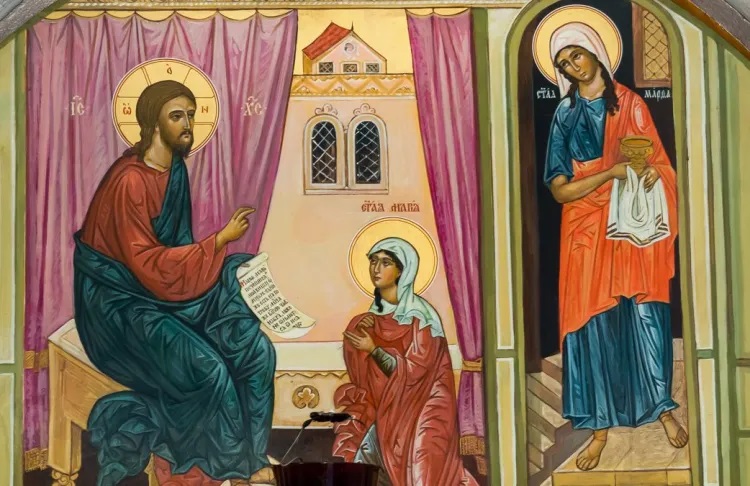- Home
- About us
- Students
- Courses
- Research
- Library
- News & Events
- Gallery
- Contact
- Our Blog
Latest News

Mary and Martha (Lk 10:38-42):
A Paradigm for Christ-Centred Living - "the only one thing needful"

by Assoc. Professor Philip Kariatlis (Sub-Dean)
The story of Mary and Martha, the two sisters of Lazarus, whom Jesus had brought back to life after his beloved friend had been dead for four days in a tomb, is very instructive for the way that we are called to live a Christ-centred life in the twenty-first century. In the Gospel according to St Luke, we are told that, upon hearing that Jesus would visit their home, both Mary and Martha were overcome with much joy and excitement (cf. Lk 10:38). Furthermore, we learn that whilst both sisters were delighted to welcome Jesus into their home, their ensuing actions, following Christ’s arrival, were quite different, if not entirely antithetical.
The Gospel reveals that Martha focused wholly on preparing the house, on shouldering all the tasks associated with extending hospitality when we receive guests into our home. Not necessarily a bad thing! And once Jesus came, she continued stressing and fretting. Mary, on the other hand, is distinctly portrayed as ‘sitting quietly at the Lord’s feet and listening to the words of Christ’ (cf. Lk 10:39); she is not distracted by household tasks, nor is she preoccupied with what others are doing, and worse, passing judgement on what she thinks her sister, Martha, ought to have been doing.Quite the opposite, she is totally focused—we could even say totally enthralled and captivated—as the Lukan account relates, by “the only one thing needful [ἐνὸςδέ ἐστιν χρεία]” (Lk 10:42).
We have here a most compelling example of what Christian discipleship looks like: a person whose thoughts do not wander onto secondary things of less importance but remain anchored on Christ. The very first step for how we might venture to live a Christ-centred life is, quite simply, to take that first intentional step—namely, that joy-filled, but at the same time, daunting decision—to re-orientate our life towards Christ, who is ‘the only one thing needful’.
Indeed, Mary’s stance becomes instructive for all of us today: it shows us the importance of stopping all that we are doing within our extremely busy schedules, setting time aside on a daily basis, to reflect on this “only one thing needful”; namely, nurturing a relationship with Christ on a daily basis. The story reminds us of the importance of bringing ourselves into the presence of Christ, like Mary did; spending time before God in prayer, listening silently and attentively for his voice on a daily basis.
Specifically with regards to prayer, St Isaac the Syrian—a 7th century father of the Church—notes so movingly: “Let every prayer that you offer in the night be more precious in your eyes than all your activities of the day.”[1] There is nothing more important in life than remaining ‘still’ and ‘silent’, seeking the One who loves us beyond imagination, and allowing ourselves, at the same time, to be moulded by the invisible and benevolent Hands which moulded the Universe.
St Maximus the Confessor, a contemporary of St Isaac highlights the importance of allowing our heart and soul to be softened like wax is softened by the sun—and not like clay which is hardened when exposed to the sun’s rays—so that our life may take on “the impressions and characteristics of divine traits [and so become] by the Spirit the dwelling place of God.”[2] Christ is our present! Christ is our future! Christ, in the words of a contemporary saint, St Porphyrios, “is everything [ὁΧριστόςεἶναιτὸπάν].”
A great temptation for all of us today, is that we can easily engross ourselves in our work—and whatever else we do—to such a great extent, that we can starve ourselves of being spiritually nurtured. Mary highlights the need to learn to say, to ourselves, that some activities can wait. Furthermore, if our desire is to place Christ permanently in our hearts then other pursuits and preoccupations in our life—not necessarily sinful or wrong in and of themselves—may need to be eliminated so that we may have the time to focus on Christ.
One simple example is learning to spend less hours endlessly scrolling on our phones; literally wasting time throughout the day on futile and even pointless practices. Eliminating such an aimless habit would immediately give us time to commit ourselves to Christ and to one another. In order to commit ourselves to Christ, we need to nourish our soul with reading His Word, namely, reading the Scriptures; spending time in reflection and prayer; taking the time to set goals which will allow us to achieve “the one thing needful”.
If we truly desire to have Christ front and centre of our lives, if we truly desire to become one with Him, to bring ourselves into His loving and enduring Presence—which, the saints tell us, is the very purpose of our existence—then we must find ways to stop, as St Paul tells us, from “wander[ing] away into endless myths” (2Tim 4:4), into fictitious fantasies and distractions. We need to find some time, every day, to reflect on what truly matters, and where our future truly lies. And where does our future lie?
In his teachings, St Kosmas Aitolos (18th cent. saint and neomartyr of the Church) says quite simply, yet most profoundly, that the birds were created for the air; the fish for the seas, the animals for the land, and human beings were created for God’s future kingdom; “we have no home here on earth.”[3] St Paul writes the same: “our citizenship is in heaven, and it is from there that we are expecting a Saviour” (Phil 3:20).According to St Isaac—to quote him again—the joy that this future kingdom can present us with, “is… stronger than the present life… a love [which] is sweeter than life… sweeter than honey and the honeycomb.”[4]
Christ alone is truly permanent, and not fleeting. He alone can gift us with a life which is truly indestructible and not fragile; a life which alone is enduring and not ephemeral; everlasting and not transitory. We are called to invite Him into our hearts permanently, and in a most personal manner; to truly refer to Him, as we do in a prayer before Holy Communion, “my Christ, the triple-radiant light… O Giver of life, my breath, my life, my joy and the world’s salvation.”[5] Note the intimacy with which St Symeon the New Theologian addresses Christ! And yet, if we truly desire to live a Christ-centred life, we need to realise that He indeed is “the only one thing needful” as Mary so movingly did!
[1]St Isaac the Syrian, The Ascetical Homilies, Homily 64, trans. The Holy Transfiguration Monastery (Boston, MA, 1984), 308.
[2]St Maximus the Confessor, Two Hundred Chapters on Theology, 1.12.
[3]Cf. St Kosmas Aitolos, Fifth Teaching: “The most gracious God made us, my brethren, human beings, and not animals. He made us more honourable than the whole world. The most gracious God gave us, my brethren, eyes to look at the sky, the sun, the moon, and the stars so we can say: “O my God, if the sun which is your creation is so bright, how much brighter are you, O Holy Name, you who are the creator of heaven and earth, the author and fashioner? Οmy God, find me worthy to enjoy you.” And in his First Teaching: “We, my fellow Christians, have no home here on earth. This is why God made us with an upright head and put our brain on the upper part of our body, so that we can always reflect the heavenly kingdom, our true home.”
[4]St Isaac the Syrian, The Ascetical Homilies, Homily64.
[5]Service for the Preparation of Holy Communion, St Symeon the New Theologian, Prayer 7



.png)